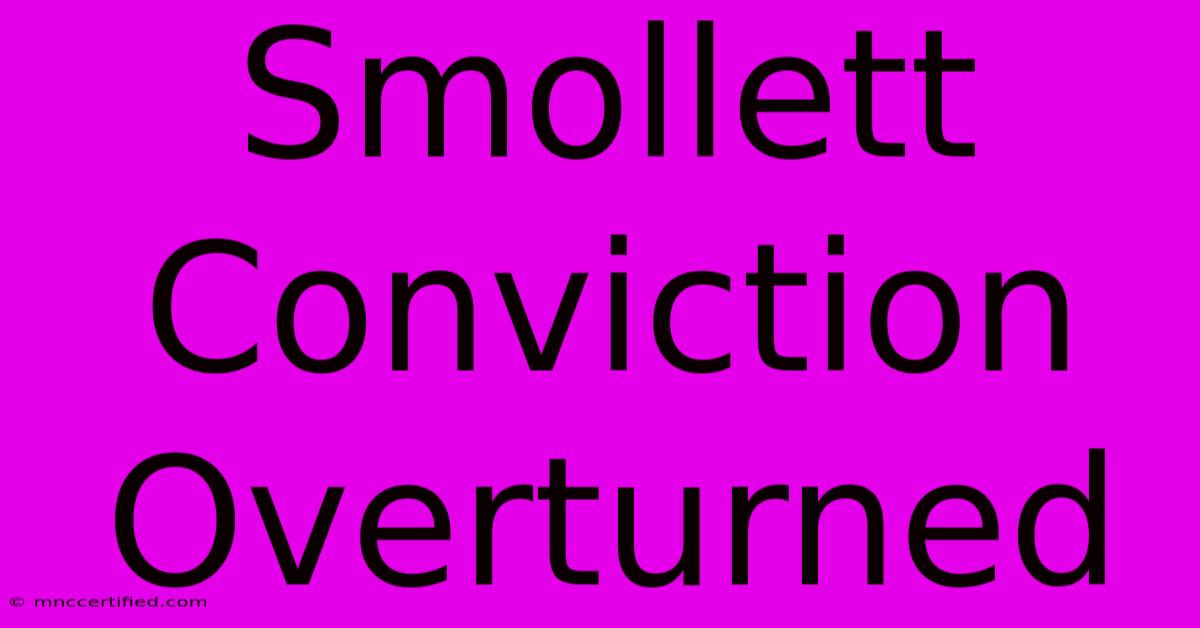Smollett Conviction Overturned

Table of Contents
Smollett Conviction Overturned: A Deeper Look at the Case and Its Implications
The 2020 conviction of Jussie Smollett on charges of disorderly conduct for staging a hate crime was overturned in March 2022. This decision sent shockwaves through the legal and media worlds, sparking renewed debate about the case's complexities and raising important questions about due process and the pursuit of justice. This article delves into the details of the case, the reasons behind the overturned conviction, and the broader implications of this controversial ruling.
Understanding the Original Case
Jussie Smollett, a then-actor on the television show Empire, claimed to have been the victim of a hate crime in January 2019. He reported being attacked by two masked men who shouted racial and homophobic slurs, poured bleach on him, and wrapped a rope around his neck. The incident immediately garnered significant media attention and sparked widespread outrage.
However, Chicago police launched a thorough investigation, eventually concluding that Smollett had orchestrated the entire event himself. He was subsequently charged with disorderly conduct for filing a false police report, a Class 4 felony in Illinois. The prosecution argued that Smollett paid two brothers, Abimbola and Olabinjo Osundairo, to stage the attack. Smollett maintained his innocence throughout the trial.
The Overturning of the Conviction
Judge James Linn, presiding over Smollett’s case, vacated the conviction, citing concerns about the prosecution's actions. Specifically, he noted the removal of Special Prosecutor Dan Webb from the case after the original jury found Smollett guilty. Judge Linn argued that this action violated Smollett's Sixth Amendment right to a fair trial. This amendment guarantees the right to counsel and a fair trial. He determined that the dismissal of the special prosecutor, appointed to handle the case due to conflict of interest concerns, fundamentally undermined Smollett's defense.
The judge's decision focused heavily on the procedural irregularities rather than the merits of the original case. He didn't declare Smollett innocent, but rather deemed the conviction invalid due to process violations. This technicality, while crucial in legal terms, left many with lingering questions about the truth of Smollett’s initial claims.
Key Arguments in the Overturning:
- Violation of Sixth Amendment Rights: The judge centered his decision on the procedural issue of the special prosecutor's removal. This was deemed a significant breach of Smollett's right to a fair trial.
- Due Process Concerns: The handling of the case, particularly the dismissal of the special prosecutor, raised serious concerns about due process and the fairness of the proceedings. This is a cornerstone of the American judicial system.
- Procedural Irregularities: The judge highlighted several procedural missteps during the case, culminating in the decision to overturn the conviction.
Implications and Aftermath
The overturning of Smollett’s conviction has had far-reaching consequences. It raised concerns about the potential for individuals to falsely claim hate crimes without facing serious repercussions. The case also fueled debates about the media’s role in disseminating information before full investigations are completed. Furthermore, it highlighted ongoing discussions about racial and homophobic bias in the justice system.
The decision continues to be debated and analyzed by legal scholars and the public alike. The case serves as a stark reminder of the intricate complexities within the legal system and the importance of upholding due process, even in high-profile and emotionally charged situations. Questions surrounding the truthfulness of Smollett's initial claim persist, even after the conviction was overturned on procedural grounds.
SEO Keywords Used:
- Jussie Smollett
- Smollett Conviction
- Conviction Overturned
- Hate Crime Hoax
- Sixth Amendment
- Due Process
- Fair Trial
- Special Prosecutor
- Chicago
- Illinois
- False Police Report
- Legal Case
- Judicial System
- Media Coverage
- Procedural Irregularities
This article provides a comprehensive overview of the Smollett case and its overturning, incorporating relevant keywords naturally within the text to optimize for search engines. Remember, effective SEO requires a multifaceted approach, including both on-page optimization (as seen here) and off-page strategies like building backlinks and promoting the content on social media.

Thank you for visiting our website wich cover about Smollett Conviction Overturned. We hope the information provided has been useful to you. Feel free to contact us if you have any questions or need further assistance. See you next time and dont miss to bookmark.
Featured Posts
-
Week 13 Bengals Lb Predicts Steelers Win
Nov 22, 2024
-
Hey Bobo Cafe Food And Drink Spot
Nov 22, 2024
-
Insurance Land In Deland Florida
Nov 22, 2024
-
Outpouring Of Grief Ken Reids Funeral
Nov 22, 2024
-
Laos Methanol Poisoning Kills Five Injures Two
Nov 22, 2024